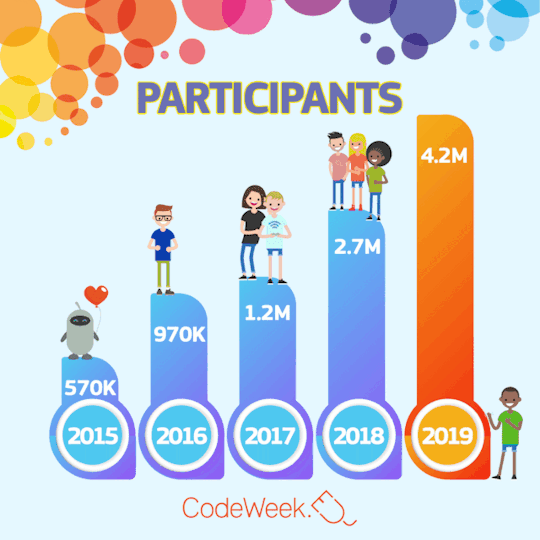New record for EU Code Week: 4.2 million participants and more than 72,000 activities in 2019
Publication date: January 23, 2020
The results are in for EU Code Week 2019, which proved to be the largest ever: a total of 4.2 million participants took part in more than 72 000 activities in over 80 countries around the world. While most of the activities offered a chance to discover computational thinking and the basics of coding in a fun and engaging way, an increasing number focused on advanced technologies such as robotics or artificial intelligence. The next edition will take place from 10 to 25 October 2020.

Of the EU, Western Balkans and EU Candidate countries, Montenegro (241), Austria (1 417), Portugal (742), North Macedonia (458), Finland (145), Romania (1 498), Poland (15 434), Kosovo (14),
Malta (537), Turkey (20 839), Greece (891), Belgium (265), Bosnia and Herzegovina (99), Croatia (891) and Cyprus (72) more than doubled their activities compared to 2018. More detailed
data and additional statistics from 2019 are available in this blog post.
Focus on teacher training to help reach students in classrooms worldwide
In 2019, EU Code Week brought coding and computational thinking to more schoolchildren than ever before. The average participant was 11 years old and 49% of participants in 2019 were women or girls. 92% of EU Code Week events took place in schools, which show that efforts to empower teachers during the 2019 campaign have been successful.
EU Code Week provides teachers with free resources, ready-made lesson plans, online introductory courses and other materials to help them bring coding and technology to all subjects and classrooms. Two massive open online courses (MOOCs) organised in 2019 saw participation from thousands of people from 80 countries. Topics included coding, computational thinking, visual programming, robotics, and app development.
The EU Code Week blog is full of examples of the huge variety of activities that were organised in 2019. In one activity in Croatia, 6th-grade students learned how to use coding to create pedometers in their physical education class and ultimately compete in teams in a competition counting steps. In another example from Portugal, young schoolchildren were
introduced to the basics of computational thinking and robotics through games. A public library in Greece hosted an activity where children and adults learned about programming, electronic circuits, educational robotics, as well as 3D printing.
Building alliances
The Code Week 4 all challenge became an important success factor for the 2019 edition. It stimulates collaboration and the sharing of good practices across cities, regions and countries. Organisers formed more than 2 400 alliances between activities. 596 of them connected at least 10 activities, 655 involved more than 500 participants and 137 alliances spread across three or more countries. In total, 1 177 alliances fulfilled at least one of the three criteria and their organisers will receive a special certificate. 53 alliances met all three conditions.
EU Code Week hackathons in 6 countries in 2020
The next edition of Code Week will take place between 10-25 October 2020 and organisers can already start registering their activities on the EU Code Week map.
One major development in 2020 will be the inclusion of local hackathons, which will be organised for secondary students in Ireland, Italy, Latvia, Romania, Slovenia and Spain. Each hackathon
will feature 60 or so participants organised into teams, with 36 hours each to solve a particular problem. Each hackathon will lead to a pitch to a jury composed of tech experts and the winning team will win prizes, including a trip to Brussels. In parallel, workshops on coding, robotics and other subjects will be organised to teach beginners the basics.
What is EU Code Week?
EU Code Week is a grassroots movement run by volunteers – ambassadors, leading teachers and coding enthusiasts around the world. It is backed by the European Commission and education ministries in the European Union and Western Balkan countries. The European Commission supports EU Code Week as part of its Digital Single Market strategy and through the Digital Education Action Plan
For more information
EU Code Week – Bringing ideas to life
EU Code Week activities map and scoreboard
EU Code Week 2019 full results
EU Code Week blog
Follow EU Code Week on Facebook, Twitter and Instagram.
Full press release available in 29 languages here.


